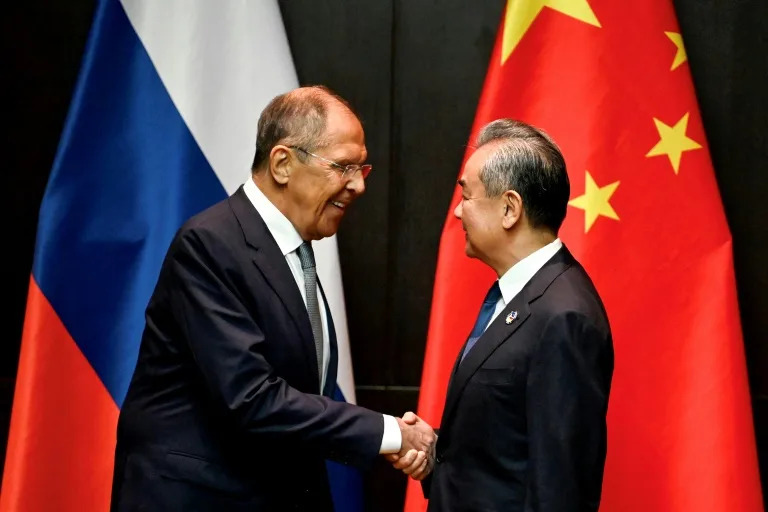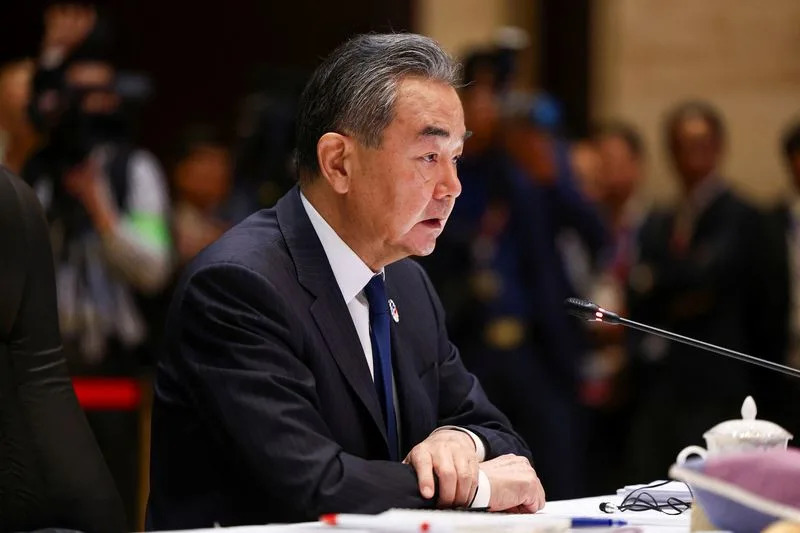Russia's Foreign Minister Sergei Lavrov (left) shakes hands with his Chinese counteropart Wang Yi on the sidelines of the ASEAN meeting in Vientiane
China and Russia's foreign ministers met their Southeast Asian counterparts Friday after vowing to counter "extra-regional forces", a day before Washington's top diplomat was due to arrive.
Wang Yi and Sergei Lavrov were attending a three-day meeting of the 10-member Association of Southeast Asian Nations (ASEAN) bloc in the Laos capital Vientiane.
Both held talks with counterparts from the bloc, while Wang also met with new British Foreign Secretary David Lammy.
On Thursday Wang and Lavrov agreed to work together in "countering any attempts by extra-regional forces to interfere in Southeast Asian affairs", according to Moscow's foreign ministry.
They also discussed implementing "a new security architecture" in Eurasia, Lavrov said in a statement, without elaborating.
According to a readout from Chinese state news agency Xinhua, Wang said Beijing was "ready to work with Russia to... firmly support each other, safeguard each other's core interests".
China is a close political and economic ally of Russia, and NATO members have branded Beijing a "decisive enabler" of Moscow's war in Ukraine.
US Secretary of State Antony Blinken is expected to arrive in Vientiane on Saturday morning for talks with ASEAN foreign ministers.
Blinken has made Washington's alliances in Asia a top foreign policy priority, with the aim of "advancing a free and open" Indo-Pacific -- a veiled way of criticizing China and its ambitions.
But Blinken shortened his Asia itinerary by a day to be present for Thursday's White House meeting between Biden and Israeli Prime Minister Benjamin Netanyahu.
Wang and Blinken will meet in Laos, a spokeswoman for Beijing's foreign ministry said, to "exchange views on issues of common concern".
- South China Sea dispute -
On Friday Wang met ASEAN foreign ministers and hailed Beijing's deepening economic ties with the region.
For the customary joint handshake, Wang stood next to Myanmar's representative Aung Kyaw Moe, permanent secretary to the foreign affairs ministry.
The ASEAN bloc has banned Myanmar's junta from high-level meetings over its 2021 coup and crackdown on dissent that have plunged the country into turmoil.
Lavrov also met ASEAN counterparts at the venue in Vientiane but did not take questions from journalists
ASEAN ministers are expected to issue a joint communique after the three-day meeting.
One diplomatic source said the joint communique is being held up by lack of consensus over the wording of the paragraphs on the Myanmar conflict and disputes in the South China Sea.
Beijing claims the waterway -- through which trillions of dollars of trade passes annually -- almost in its entirety despite an international court ruling that its assertion has no legal basis.
Several Southeast Asian countries have competing claims..
AfriPrime App link: FREE to download...
https://www.amazon.com/Africircle-AfriPrime/dp/B0D2M3F2JT
Chinese Foreign Minister Wang pledges to work with Russia on East Asian peace
Chinese foreign minister Wang Yi said China and Russia should maintain communication and coordination on East Asian cooperation to promote regional peace and stability amid international turbulence.
Wang met with Russian Minister of Foreign Affairs Sergei Lavrov during an ASEAN summit in Laos on Thursday, where he also had a sideline meeting with India's foreign minister to ease tensions around a long-simmering border dispute.
In his meeting with Lavrov, Wang said in the face of a turbulent international situation and external interference and resistance, "China is ready to work with Russia to firmly support each other and safeguard each other's core interests," according to a statement from China's foreign ministry on Friday.
"Russia will work with China to support ASEAN centrality and prevent sabotage and interference by foreign forces," Lavrov said, according to the statement.
During a separate China, Russia and Laos trilateral foreign ministers' meeting in Vientiane, Wang also said "the world is entering a new period of turbulence and change, the international system is undergoing profound adjustments, and the global economic recovery is difficult."
He stressed that "regional conflicts have dragged on, and instability, uncertainty and unpredictability have permeated the world," according to a separate statement from the Chinese foreign ministry.
Wang is also expected to meet Japan Minister of Foreign Affairs Yoko Kamikawa on Friday. He is scheduled to attend several ASEAN meetings through Saturday.
AfriPrime App link: FREE to download...
https://www.amazon.com/Africircle-AfriPrime/dp/B0D2M3F2JT
China and India pledge to boost border peace efforts as Wang Yi urges 'rational approach'
At their second meeting this month, Chinese Foreign Minister Wang Yi and his Indian counterpart Subrahmanyam Jaishankar agreed to make "concerted efforts" to keep the peace along their disputed border and improve communication.
The ministers spoke on Thursday on the sidelines of the Association of Southeast Asian Nations (Asean) foreign ministers' meeting in Vientiane, Laos, just three weeks after talks at the Shanghai Cooperation Organisation (SCO) summit in Astana, Kazakhstan, where a reconciliatory tone was established.
Without mentioning the Himalayan border, which saw military clashes in May 2020 followed by deteriorating ties, Wang urged India and China to "take a rational approach to rise above differences and frictions".
"It is hoped that the two sides will work together to actively explore the right way for the two big neighbours to get along with each other and guide all communities to develop positive perceptions of each other," Wang said, according to a statement from his ministry.
He added that putting bilateral relations back on the right track would serve the interests of both sides and meet the shared aspirations of countries in the Global South, reinforcing the stance he took at the dialogue in Kazakhstan, where both leaders agreed that prolonging border disagreements was not in the interest of either side.
Since the deadly clashes four years ago, Beijing and New Delhi have carried out several rounds of military talks and have disengaged from four points along the border. But both sides have steadily built up military capabilities in the region.
"The two sides agreed to make concerted efforts to maintain peace and tranquillity in the border areas and work for new progress in consultations on border affairs," the Chinese ministry statement said, adding that they were ready to strengthen communication through platforms such as the East Asia Summit, the Group of 20 (G20), Brics and the SCO.

Indian Foreign Minister Subrahmanyam Jaishankar arrives to attend the 57th Asean Foreign Ministers' Meeting in Vientiane, Laos on Thursday.
Jaishankar also maintained a forward-looking stance, while acknowledging that the border conflicts had cast a "shadow" over the two countries' "broad converging interests".
"But the Indian side is ready to take a historic, strategic and open perspective to find solutions to the differences and get the bilateral relations back to a positive and constructive track," he said, according to the Chinese statement.
"Maintaining stable and predictable development of the bilateral relations is entirely in the interests of the two sides, and holds special significance to upholding regional peace and promoting multipolarity."
On social media platform X, formerly Twitter, Jaishankar said the two countries "agreed on the need to give strong guidance to complete the disengagement process" and "must ensure full respect for the [Line of Actual Control] and past agreements".
The Line of Actual Control refers to the 3,200km (1,988-mile) disputed border that separates Chinese-controlled and Indian-controlled territories.
"It is in our mutual interest to stabilise our ties. We should approach the immediate issues with a sense of purpose and urgency," Jaishankar wrote.
In May, Beijing sent ambassador Xu Feihong to fill an 18-month vacancy at the Chinese embassy in New Delhi, in a show of willingness to manage differences and improve ties.
AfriPrime App link: FREE to download...




